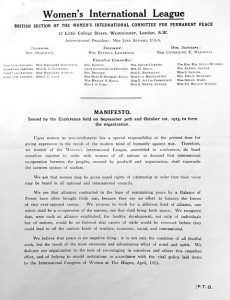
Women’s International League Manifesto
Catherine was Hon. Secretary of this peace organisation during the First World War
Courtesy of Women’s International League for Peace and Freedom
www.wilpf.org
From 1917 Catherine Marshall, suffragist and peace activist from Keswick, was less politically active and there were periods of poor health. She did remain active in the Labour Party, the Union of Democratic Control and was involved in the United Nations Association. In the late 1930s her international concerns led to an interest in the plight of refugees and she became active on the British Committee for Refugees from Czechoslovakia. Her work was not, however, confined to intellectual activities of letter writing, campaigning and networking as it had in the past. It now extended to provision of practical support. Catherine and her brother, Hal, had inherited Hawse End, a property at the edge of Derwent Water, near Keswick in Cumberland from their parents, Caroline and Frank Marshall. An article in the Manchester Guardian of 14 October 1938, ‘Uncertain fate of refugees in Czechoslovakia,’ had highlighted an urgent refugee problem. Catherine responded to the perceived need by supporting initiatives for Jewish refugees fleeing from Czechoslovakia and providing accommodation at her home in Cumbria. An Austrian refugee was appointed as Catherine’s cook, housekeeper and companion. The Czech Refugee Trust Fund administered work at Hawse End, which was used as a hostel, and Catherine acted as adviser to the Trust. She acted as liaison officer to the Aliens’ Tribunal and her archives in Cumbria refer to her work with the refugees, including lists of name and work with individuals.
References/Further Reading:
Manchester Guardian, 14 Oct 1928. Catherine E. Marshall: correspondence and personal records 1893-1956. Archive ref: DMAR2/51, Cumbria Archives Service.

